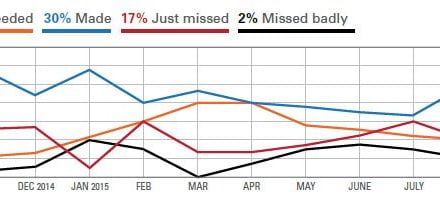By the time this edition hits your desk, it’s likely that almost the entire Australian electorate will be heartily sick of the federal election that has now been called for 2 July. But this is no ordinary election – it is, as many wags have quipped, the double disillusion election. The trigger was the failure of the Senate to pass legislation to transform the Fair Work Building Commission into the Australian Building and Construction Commission.
So what’s going to happen after the election, if the Coalition prevail? For those of us who weren’t paying attention last time this happened (1987, if you were keeping track), the Australian Constitution sets out a process.
If the Coalition wins the election on 2 July, they could present the ‘trigger Bill’ to the Senate once again. They are not obliged to, even if they called a double dissolution election over the issue. If they do, and the Senate still refuses to pass the legislation, Prime Minister Turnbull, who would (presumably) still be leading the Coalition, could ask the Governor General to convene a Joint Sitting of both the House of Representatives and the Senate. If the Coalition has an absolute majority across both houses, the Bill could be passed and treated as if it has been approved in the normal way.
But what’s the trigger about? What are the differences between the (current) Fair Work Building Commission (FWBC) and the (proposed) Australian Building and Construction Commission (ABCC)?
Most people operating in or on the periphery of the commercial or infrastructure construction industry would be aware that it is one of the last bastions of union militancy. The bulk of the recent prosecutions by the FWBC have involved the CFMEU (Construction, Forestry, Mining & Energy Union), not because the regulator is biased against the union, but because the CFMEU is a proud recidivist in this area.
Over the last twenty years, there have been numerous official enquiries, including two Royal Commissions, at which evidence has been given of unlawful or intimidatory behaviour in the industry. I frequently receive calls from distressed employers who have been refused permission to work on a construction site until they sign a CFMEU agreement. If I advise the employer to get the regulator involved, their reluctance is palpable. They don’t want to get a name as a ‘troublemaker’, for fear they will not get any more work, but they can’t afford to sign the CFMEU agreement that would price them out of three quarters of their work.
And at the heart of this conundrum lies one of the main differences between the FWBC and the ABCC – the ability of the regulator to require a witness, such as an employer, to provide information.
The CFMEU has produced a campaign advertisement that alleges that a construction worker being questioned by the ABCC would have no right to remain silent, whereas a drug dealer being questioned by the police does have that right. This assertion is ‘nonsense’, to quote the Australian Broadcasting Commission Fact Check, updated on 27 April 2016.
The CFMEU are confusing two issues. Someone who is suspected of criminal activity (the drug dealer) has the right to remain silent to avoid incriminating themselves. A person who is required to turn up for questioning by the ABCC is not suspected of any breach of law themselves – they are providing information about potentially unlawful activity they have witnessed. So in my example above, the employer could, if the ABCC were in place, be compelled to provide their evidence.
And that’s where this compulsion to provide information would be useful – if the employer is required to talk to the ABCC, then they can’t be accused of having voluntarily cooperated with the authorities. And therefore, they aren’t a “troublemaker” in the industry. After all, failure to comply with such a requirement could, under the proposed legislation, result in 6 months in jail.
Additionally, any information that someone provides during a compulsory examination by the ABCC cannot later be used against the witness. Whereas any information a drug dealer provides to the police during an interview can later be used against them in prosecution.
The Coalition’s Minister for Employment, Michaelia Cash, was asked by the ABC Fact Check team to comment on the CFMEU’s assertion that a building worker has fewer rights than an ice dealer. She said “… The ice dealer is suspected of doing the wrong thing – the victim of CFMEU thuggery who was too afraid to be seen to come forward and speak out voluntarily is not suspected of any wrongdoing.”
The ‘trigger Bill’ is designed to address specific problems in an industry where it is generally acknowledged there is more flouting of industrial laws and community standards than in other industry sectors. Unlawful industrial action, picketing, coercion discrimination and other unsavoury behaviour have been identified as rife in parts of the commercial construction industry.
Unfortunately, it is also far too common for employers to avoid their own responsibilities as employers, leading to underpayment of employees and failure to comply with reasonable safety standards. It’s safe to say that the construction industry has some issues in this area.
The ABCC legislation is not specifically aimed at the CFMEU. The purposes include:
- Promoting respect for the rule of law
- Ensuring respect for the rights of building industry participants
- Ensuring that building industry participants are accountable for their unlawful conduct
- Improving work health and safety in building work
All of these objectives are reasonable and even-handed. They apply equally to employers, contractors, unions and employees.
Another key difference between the FWBC and the proposed ABCC is the size of penalties for breaches of the legislation. Under the Fair Work Act 2009 (Cth), the most common maximum penalty for a company is 300 penalty units (currently worth $54,000) and 60 penalty units ($10,800) for an individual. If the ABCC legislation becomes law, then the maximum penalties in the construction industry become $180,000 for a company or $36,000 for an individual.
Other features of the ABCC legislation include:
- A more rigorous Building Code for contractors who wish to tender for Commonwealth work, requiring that their industrial relations arrangements comply with both the spirit and the letter of the law;
- The introduction of a Federal Safety Commissioner, who will enforce safety standards in the construction industry and provide accreditation for any contractor who wants to tender for Commonwealth funded construction work; and
- A specific prohibition on coercion, for example, to combat attempts to force all employees in the construction industry into a particular superannuation fund, even if they are legitimately a member of another fund.
There is no guarantee that this matter will even be put to the test after the election on 2 July, however, given the Coalition’s track record in this area under Prime Minister Howard, I would be surprised if they don’t pursue passage of this legislation if they win the election.
Emma Watt is an independent industrial relations consultant with almost 20 years’ experience in the timber industry.
Phone: 0411 708 073 or Email: emma@emmawatt.com.au










